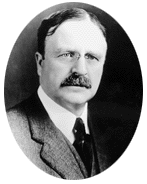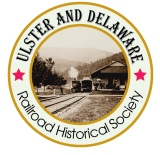|
|||
|---|---|---|---|
According to an article by Freeman Hubbard in the old Railroad Man's
Magazine for February, 1931, one of New York City's most colorful and
popular mayors, James J. (Jimmy) Hylan (mayor from about 1917 to 1925) started out as a railroad man - and
look where he started:
(mayor from about 1917 to 1925) started out as a railroad man - and
look where he started:
"The first locomotive I ever saw," the magazine quotes Mayor Hylan, "was at the Ston(e)y Clove Notch in the Catskill Mountains when I was a mere boy. This was approximately forty-eight years ago [about 1883]. I then resolved that the height of my ambition would be to become a locomotive engineer. I remember well the engineer's name was Frank Conerty. In my estimation, he was a great man. He started the locomotive and opened the cylinder cocks and the steam escaped and frightened my two younger brothers and myself. "Some time later, I secured a job as a water boy on the grading of the extension of this line, then a job as a section hand and finally I secured a position as a night watchman of the same locomotive I saw in the Ston(e)y Clove Notch which Frank Conerty ran. After that I was promoted to become a stoker on the same line. There were only two locomotives on the Ston(e)y Clove Railroad and the engineers seemed to have lifetime jobs, so I concluded there was no opening and went to New York City." Truly a self-made man, Hylan grew up a poor farm boy with limited education who, at 19, came to New York City with $4.50 in his pocket. He performed various odd jobs, including operating a steam locomotive for the Brooklyn Elevated Railroad, and he secured a patent for a bicycle whistle. He graduated from New York Law School in 1897 and became active in politics. Hylan successfully engineered a constitutional amendment in the state legislature to create two new Brooklyn judgeships - and a job for himself. In 1917, Hylan ran for mayor on the Tammany Hall ticket, overwhelmingly defeating John Purroy Mitchel. He delivered a simple speech during his inauguration, an affair devoted to dispensing patronage evenly between his Brooklyn supporters and Tammany Hall. On his first day in office, Hylan charged his appointees "to make the world yearn for Democracy" by following his "Rules for City Employees." He declared: "[City workers] must not roll in city automobiles with cigars in their mouths...[or] be conspicuous at baseball games when they should be in their offices." Dubbed "Honest John" by his supporters, Hylan never strayed far from the will of Tammany Hall. He devoted much of his term to transit issues and was reelected based on his opposition to a state plan that would have increased the five cent subway fare. He also was a strong advocate for New York City home rule. Hylan ran for a third term, but lost the primary to James Walker and ran again in 1932, only to withdraw his candidacy. He died of a heart attack at his home in Forest Hills on January 12, 1936. |
|||
|
|
